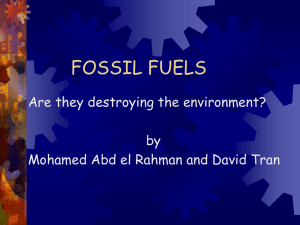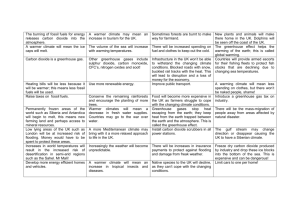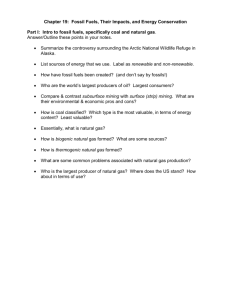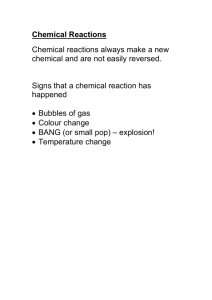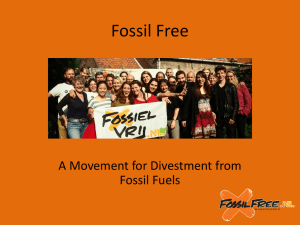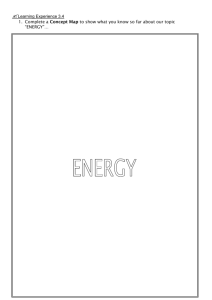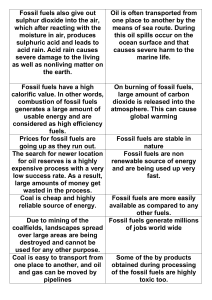Add Header – ODE Apple, no shaping - ODE IMS
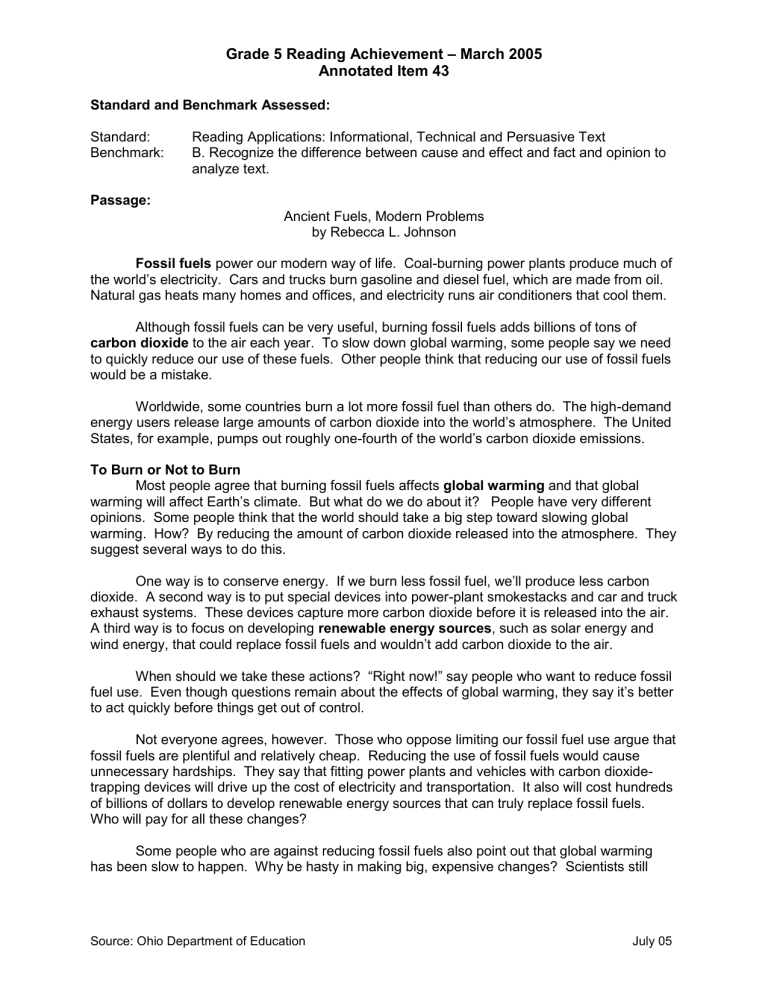
Grade 5 Reading Achievement
– March 2005
Annotated Item 43
Standard and Benchmark Assessed:
Standard: Reading Applications: Informational, Technical and Persuasive Text
Benchmark: B. Recognize the difference between cause and effect and fact and opinion to analyze text.
Passage:
Ancient Fuels, Modern Problems by Rebecca L. Johnson
Fossil fuels power our modern way of life. Coal-burning power plants produce much of the world’s electricity. Cars and trucks burn gasoline and diesel fuel, which are made from oil.
Natural gas heats many homes and offices, and electricity runs air conditioners that cool them.
Although fossil fuels can be very useful, burning fossil fuels adds billions of tons of carbon dioxide to the air each year. To slow down global warming, some people say we need to quickly reduce our use of these fuels. Other people think that reducing our use of fossil fuels would be a mistake.
Worldwide, some countries burn a lot more fossil fuel than others do. The high-demand energy users release large amounts of carbon dioxide into the world’s atmosphere. The United
States, for example, pumps out roughly onefourth of the world’s carbon dioxide emissions.
To Burn or Not to Burn
Most people agree that burning fossil fuels affects global warming and that global warming will affect Earth’s climate. But what do we do about it? People have very different opinions. Some people think that the world should take a big step toward slowing global warming. How? By reducing the amount of carbon dioxide released into the atmosphere. They suggest several ways to do this.
One way is to conserve energy. If we burn less fossil fuel, we’ll produce less carbon dioxide. A second way is to put special devices into power-plant smokestacks and car and truck exhaust systems. These devices capture more carbon dioxide before it is released into the air.
A third way is to focus on developing renewable energy sources , such as solar energy and wind energy, that could replace fossil fuels and wouldn’t add carbon dioxide to the air.
When should we take these actions? “Right now!” say people who want to reduce fossil fuel use. Even though questions remain about the effects of global warming, they say it’s better to act quickly before things get out of control.
Not everyone agrees, however. Those who oppose limiting our fossil fuel use argue that fossil fuels are plentiful and relatively cheap. Reducing the use of fossil fuels would cause unnecessary hardships. They say that fitting power plants and vehicles with carbon dioxidetrapping devices will drive up the cost of electricity and transportation. It also will cost hundreds of billions of dollars to develop renewable energy sources that can truly replace fossil fuels.
Who will pay for all these changes?
Some people who are against reducing fossil fuels also point out that global warming has been slow to happen. Why be hasty in making big, expensive changes? Scientists still
Source: Ohio Department of Education July 05
Grade 5 Reading Achievement
– March 2005
Annotated Item 43
can’t say without a doubt what will happen as the world warms. Shouldn’t we wait to take action until scientists know for sure, they ask?
Dramatic changes due to global warming may or may not be part of our future. While there’s evidence that global warming is affecting our world, there are still many questions about how extreme those effects could be. Many questions also remain about what we should do about global warming. Should we reduce the amount of carbon dioxide in the air as quickly as possible? Or will cutting back on fossil fuel use be too costly? Scientists continue to search for answers to these questions. In the meantime, the debate surrounding global warming keeps heating up!
Multiple-Choice Question:
43. Which statement is an opinion?
A.
B.
C.
D.
The world should take a big step toward slowing global warming.
The gasoline and diesel fuel burned by cars and trucks is made from oil.
Coal-burning power plants produce a great deal of electricity.
If we burn less fossil fuel, less carbon dioxide will be produced.
Commentary:
This multiple-choice question asks students to analyze the statements to determine which one is an opinion. Students need to recognize the difference between fact and opinion to respond correctly. A fact is a reality, an actuality, a truth; whereas, an opinion is a belief, a viewpoint or a judgment. Response B is clearly a fact because gasoline and diesel fuel are made from oil, a verifiable statement. In addition, it is true that less carbon dioxide is produced if we burn less fossil fuel, so response D is also a fact. Response C contains an arguable component, “…a great deal…” This “great deal” may be interpreted as varied amounts, but it is true that “coalburning power plants produce electricity,” so response C is a fact. Response A states the “world should take a big step toward slowing global warming.” This is an opinion because it expresses a belief or viewpoint that a specific action should take place in a big, meaning expansive, way.
Performance Data:
The percent of public school students selecting answer choice A for question 43 on the March
2005 Grade 5 Reading Achievement Test was 65%.
Keywords: opinion, fact, analyze text
Link Passage: “Ancient Fuels, Modern Problems”
Source: Ohio Department of Education July 05

